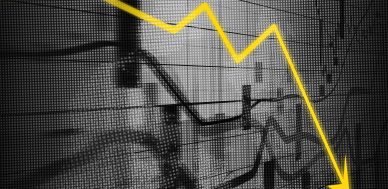Don’t Rule Out a Stock Market Crash Just Yet
The stock market could disappoint investors in 2019, just like it did in 2018. Stock investors beware, as we could see a stock market crash again later this year.
You see, earnings and valuations matter a lot.
As it stands, the earnings growth rate is stalling and valuation measures are suggesting that the stock market is overvalued.
Earnings Expected to Decline
First, let’s look at earnings.
So far, 97% of S&P 500 companies have reported their financial results for the first quarter of 2019, with a reported decline of 0.4% in earnings year-over-year. This is the first time since the second quarter of 2016 that the S&P 500 reported a decline in earnings. (Source: “Earnings Insight,” FactSet, May 24, 2019.)
For the second quarter of 2019, things continue to look dire.
As of this writing, 80 S&P 500 companies have issued negative earnings guidance, while just 25 have issued positive guidance. That’s a ratio of one to 3.5. Note that the percentage of negative guidance for the second quarter is well above the five-year average.
Analysts are becoming pessimistic as well. They expect S&P 500 companies to report a decline of two percent in earnings in the second quarter. At the beginning of the year, they were actually predicting earnings to grow in the second quarter.
Stock markets move a lot based on on earnings expectations. If earnings are expected to increase, the stock market rallies. If earnings are expected to fall, a stock market crash follows.
Stock Market 78% Overvalued?
Stock valuations remain relatively high.
One valuation measure that stock investors should pay attention to is the cyclically adjusted price-to-earnings (CAPE) ratio. As the name implies,, it’s a price-to-earnings ratio adjusted for inflation and business cycles. At the time of this writing, the CAPE ratio stands at 30.23.
But by itself, this figure means nothing. You must compare it to the historical averages.
The CAPE ratio’s historical average since 1881 is around 16.96. That means the stock market is currently trading 78% above its historical average. (Source: “Online Data Robert Shiller,” Yale University, last accessed May 27, 2019.)
However, the CAPE ratio isn’t the only measure saying the stock market is overvalued relative to historical averages. The GDP-to-stock-market ratio says the same.
What’s even scarier is that stock valuations are high at a time when earnings expectations are falling. Furthermore, according to several data sets, the U.S. economy is in the late stages of the business cycle.
Irrationality May Prevail, But Not Forever
Irrationality could move the stock market up for a while, but not forever.
The upside may be very limited on the stock market, but the downside could be a lot lower. If you are actively buying stocks thinking they will go way up, you better have a good reason for believing that.
In fact, there’s a high probability that we could be seeing a giant top forming. We’ll know more with time; never forget that attempting to predict an exact top or bottom could be a big mistake.
Consider focusing on capital preservation and raising a bit of cash for your portfolio. If there’s a stock market crash, there will be solid opportunities. Cash will be very useful and capital preservation will protect portfolios from losses.
